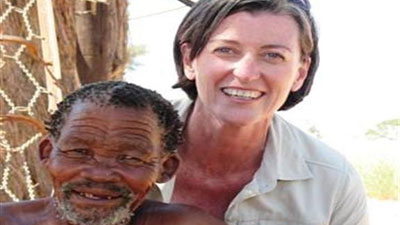SABC Radio specialist correspondent Angie Kapelianisspeaks to eco-adventurer & ex-SABC Radio presenter, Patricia Glyn, on the late Khomani San leader Dawid Kruiper. Khomani San leader Dawid Kruiper will be buried in the Kgalagadi Transfrontier Park on June 30 at 9am. Seventy-six-year-old Kruiper died at Upington last week Wednesday, June 13 after apparently suffering from Tuberculosis. Patricia Glyn says South Africa and the world have a lost “a very tall tree in the body of a small man” with Kruiper’s death.Glyn spoke to Kapelianis from Kruiper’s farm, Witdraai, in the remote and windy Kalahari Desert. “There was this tiny man, sitting on a sand dune, with this massive coat on with these bony fingers in a very old, decrepit body because he’d been in a massive car accident and his body was full of plates. I won’t forget that sight.And, of course, he greeted me with his usual great charm and huge grin. He was a prankster and joker, as well as a very wise, big-hearted man.And I’m just so privileged to have known him.”
He was very insistent that he be called a Bushman because it had extraordinary connection with the land and his knowledge of the veld
(listen to the full radio feature here)
Glyn first met Kruiper in the Kalahari Desert of theNorthern Capeover two years ago. She wanted some tips from southernAfrica’s ancient people for a long-distance walk she was planning through the desert. After several visits, Kruiper asked her if she would take him and his family on an expedition to the northernKgalagadiTransfrontierPark.His people, theKhomani San, had been totally evicted from that area by the mid-1970s. So, they desperately wanted to see their ancestral burial sites and battle grounds. They also wanted to see where Kruiper had learnt to hunt and where the Khomani San had walked freely before the arrival of all the settlers and colonialists.Glyn says: “So, last year I took Oupa Dawid and 13 members of his family, spanning three generations, back to these places.And for two months, we had this most extraordinary privilege of having a glimpse into a world, which is all but gone and also being entrusted with the secret that the Kruipers have kept in the family for about a century now. Maybe he knew he was not going to be on earth for too much longer.”Glyn is not yet ready to share that secret.She is co-producing a documentary and writing a book about Dawid Kruiper and the Khomani San.Emotions are high as she touches onKruiper’s view of the book. “He saw it as a way of getting some restitution and justice for the terrible things that have happened to him and this community, and that at last his story would be told. So, I felt deep regret that he wouldn’t ever see that book. I felt rage that he died without more having been delivered to his community on the back of the land claim that they won in 1999. Rage that they’d been so neglected.”

The 1999Khomani Sanland claim was probably Dawid Kruiper’s single-most important legacy. It entailed 25 000 hectares, as well as heritage and cultural rights in the Kgalagadi. They also got six farms on the outskirts of the park.Glyn adds: “Dawid took his community from being landless vagrants to land ownership. He saw them through that terrible process, which was hugely stressful for him. He wasn’t literate. He was a very naive man and gave too much trust to too many people and was let down so badly so often during the land claim process.But I think that is particularly what he’ll be remembered for.”She also understands why the Nama-speaking Kruiper preferred to be called aBushmanrather than Khoisan. “As far as they’re concerned “San” is a Nama word, which has very pejorative meanings like “dirty”, “filthy”, “stealing”, “thieving”. So, he was very insistent that he be called a Bushman because it had extraordinary connection with the land and his knowledge of the veld and how to live off it.”
Glyn says the most important thing she learnt from Kruiper and the Khomani San is unconditional love. “They laugh so much more than we do and they have so much less reason to laugh.They trust. They open their arms to people and they just accept whoever comes here for who they are and what they can learn from them. We’ve lost an extraordinary human being – Bushman or not!”
– By Angie Kapelianis


